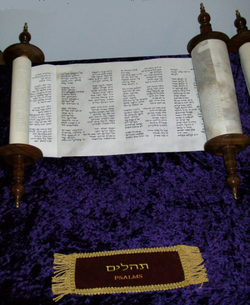Psalm 88
| Psalm 88 | |
|---|---|
← Psalm 87 Psalm 89 → | |
 Scroll of the Psalms | |
| Book | Book of Psalms |
| Hebrew Bible part | Ketuvim |
| Order in the Hebrew part | 1 |
| Category | Sifrei Emet |
| Christian Bible part | Old Testament |
| Order in the Christian part | 19 |
Psalm 88 is the 88th psalm from the Book of Psalms. According to the title, it is a "psalm of the sons of Korah" as well as a "maskil of Heman the Ezrahite". In the slightly different numbering system in the Greek Septuagint version of the Bible, and in its Latin translation, the Vulgate, this psalm is Psalm 87.
Portrayal[]
It is described Psalm for the sons of Korah, a prayer for mercy and deliverance,[1] and a Maschil.[2]
According to Martin Marty, a professor of church history at the University of Chicago, Psalm 88 is "a wintry landscape of unrelieved bleakness". Psalm 88 ends by saying:
You have taken my companions and loved ones from me;
the darkness is my closest friend.[3]
Indeed, in Hebrew, the last word of the psalm is "darkness".
Uses[]
Judaism[]
Psalm 88 is recited on Hoshana Rabbah.[4]
Eastern Orthodox Church and Catholic Church[]
- This psalm is part of the Six Psalms (Psalms 3, 38, 63, 88, 103 and 143) that constitute the heart of the orthros, that is to say Matins, in the Orthodox and Catholic Churches of the Byzantine rite.
- In the Liturgy of the Hours revised after Vatican II, the psalm is said on Fridays as part of compline.[5]
Commentary[]

It is often assumed that the Psalm is a sick Psalm.[6][7] The disease which laid low the psalmist could have been leprosy or some other unclean illness.[8][9] Others see rather than a specific disease, a more general calamity.[10][11]
By contrast, Hermann Gunkel contends that this psalm involves accusations against the Psalmist, regarding his sins mentioned.
Neale and Littledale find it "stands alone in all the Psalter for the unrelieved gloom, the hopeless sorrow of its tone. Even the very saddest of the others, and the Lamentations themselves, admit some variations of key, some strains of hopefulness; here only all is darkness to the close."[12]
Musical settings[]
- Marc-Antoine Charpentier compose around 1690 one "Domine Deus salutis meae" , H.207 for soloists, chorus, flutes, strings, and continuo.
References[]
- ^ Psalm 88:10-18
- ^ Charles Spurgeon, Treasury of David Archived 2016-01-30 at the Wayback Machine.
- ^ Psalm 88:18 (NIV)
- ^ The Artscroll Tehillim page 329
- ^ ICEL (1976). Christian Prayer: The Liturgy of the Hours. Catholic Book Publishing Corp. 1052–1053.
- ^ Hochspringen B. Klaus Seybold, Prayer of the sick in the Old Testament (1973), p169.
- ^ Willy Staerk, poetry (1920).
- ^ Hochspringen B. Klaus Seybold, Prayer of the sick in the Old Testament (1973), 169
- ^ Rudolf Kittel, Psalms (1921)
- ^ Emil Kautzsch, The Holy Scriptures of the Old Testament II (4 1923), 113ff.
- ^ Hochspringen B. Klaus Seybold, Prayer of the sick in the Old Testament (1973), 169
- ^ Neale. A Commentary on the Psalms. Vol. 3. 1871. Reprint. London: Forgotten Books, 2013. 90-1.
External links[]
- Psalms